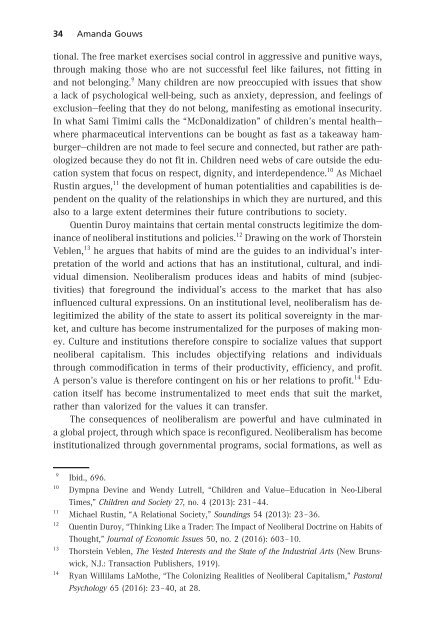Piet Naudé | Michael Welker | John Witte, Jr. (Eds.): The Impact of Political Economy (Leseprobe)
In our late modern pluralistic societies, there are tensions and complementarities between a plurality of individual and social claims and activities to shape societal life and a constructive pluralism of what is known as social systems. The latter provide normative codes and powers emanating from the areas of law, religion, the family, the market, the media, education, academic research, health care, defense and politics. A better understanding and steering of this complex division of powers is crucial for the common good and for freedom and peace. In this volume, a multi-disciplinary team of experts from Germany, Italy, Australia, the UK, the USA, and South Africa bring their conceptual, empirical and historical insights to bear in three broad sections: »The moral dimension of social systems«; »The interaction of religion, law and education with political systems«; and »The moral (mal)-formation evident in case studies on the global financial crisis and social media«.
In our late modern pluralistic societies, there are tensions and complementarities between a plurality of individual and social claims and activities to shape societal life and a constructive pluralism of what is known as social systems. The latter provide normative codes and powers emanating from the areas of law, religion, the family, the market, the media, education, academic research, health care, defense and politics. A better understanding and steering of this complex division of powers is crucial for the common good and for freedom and peace.
In this volume, a multi-disciplinary team of experts from Germany, Italy, Australia, the UK, the USA, and South Africa bring their conceptual, empirical and historical insights to bear in three broad sections: »The moral dimension of social systems«; »The interaction of religion, law and education with political systems«; and »The moral (mal)-formation evident in case studies on the global financial crisis and social media«.
You also want an ePaper? Increase the reach of your titles
YUMPU automatically turns print PDFs into web optimized ePapers that Google loves.
34 Amanda Gouws<br />
tional. <strong>The</strong> free market exercises social control in aggressive and punitive ways,<br />
through making those who are not successful feel like failures, not fitting in<br />
and not belonging. 9 Many children are now preoccupied with issues that show<br />
alack <strong>of</strong> psychological well-being, such as anxiety, depression, and feelings <strong>of</strong><br />
exclusion—feeling that they do not belong, manifesting as emotional insecurity.<br />
In what Sami Timimi calls the “McDonaldization” <strong>of</strong> children’s mental health—<br />
where pharmaceutical interventions can be bought as fast as atakeaway hamburger—children<br />
are not made to feel secure and connected, but rather are pathologized<br />
because they do not fit in. Children need webs <strong>of</strong> care outside the education<br />
system that focus on respect, dignity, and interdependence. 10 As <strong>Michael</strong><br />
Rustin argues, 11 the development <strong>of</strong> human potentialities and capabilities is dependent<br />
onthe quality <strong>of</strong> the relationships in which they are nurtured, and this<br />
also to alarge extent determines their future contributions to society.<br />
QuentinDuroy maintains that certain mentalconstructs legitimize the dominance<br />
<strong>of</strong> neoliberal institutions and policies. 12 Drawing on the work <strong>of</strong> Thorstein<br />
Veblen, 13 he argues that habits <strong>of</strong> mind are the guides to an individual’s interpretation<br />
<strong>of</strong> the world and actions that has an institutional, cultural, and individual<br />
dimension. Neoliberalism produces ideas and habits <strong>of</strong> mind (subjectivities)<br />
that foreground the individual’s access to the market that has also<br />
influenced cultural expressions. On an institutional level, neoliberalism has delegitimized<br />
the ability <strong>of</strong> the state to assert its political sovereignty in the market,<br />
and culture has become instrumentalized for the purposes <strong>of</strong> making money.<br />
Culture and institutions therefore conspire to socialize values that support<br />
neoliberal capitalism. This includes objectifying relations and individuals<br />
through commodification in terms <strong>of</strong> their productivity, efficiency, and pr<strong>of</strong>it.<br />
Aperson’s value is therefore contingent on his or her relations to pr<strong>of</strong>it. 14 Education<br />
itself has become instrumentalized to meet ends that suit the market,<br />
rather than valorized for the values it can transfer.<br />
<strong>The</strong> consequences <strong>of</strong> neoliberalism are powerful and have culminated in<br />
aglobal project, through which space is reconfigured.Neoliberalism has become<br />
institutionalized through governmental programs, social formations, as well as<br />
9<br />
10<br />
11<br />
12<br />
13<br />
14<br />
Ibid., 696.<br />
Dympna Devine and Wendy Lutrell, “Children and Value—Education in Neo-Liberal<br />
Times,” Children and Society 27, no. 4(2013): 231–44.<br />
<strong>Michael</strong> Rustin, “A Relational Society,” Soundings 54 (2013): 23–36.<br />
Quentin Duroy, “Thinking Like aTrader: <strong>The</strong> <strong>Impact</strong> <strong>of</strong> Neoliberal Doctrine on Habits <strong>of</strong><br />
Thought,” Journal <strong>of</strong> Economic Issues 50, no. 2(2016): 603–10.<br />
Thorstein Veblen, <strong>The</strong> Vested Interests and the State <strong>of</strong> the Industrial Arts (New Brunswick,<br />
N.J.: Transaction Publishers, 1919).<br />
Ryan Willilams LaMothe, “<strong>The</strong> Colonizing Realities <strong>of</strong> Neoliberal Capitalism,” Pastoral<br />
Psychology 65 (2016): 23–40, at 28.
















